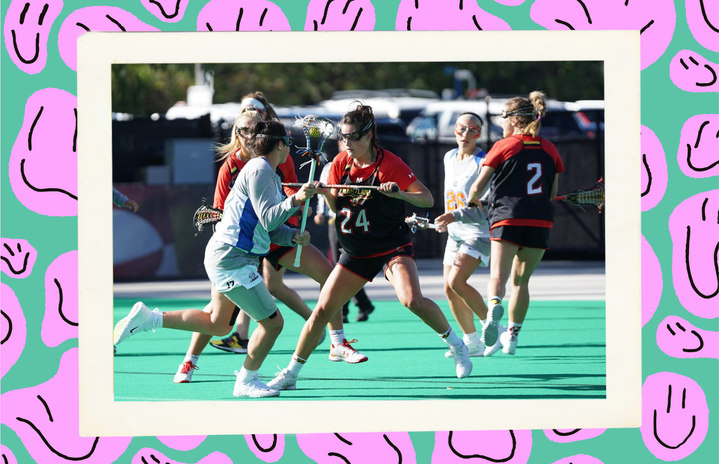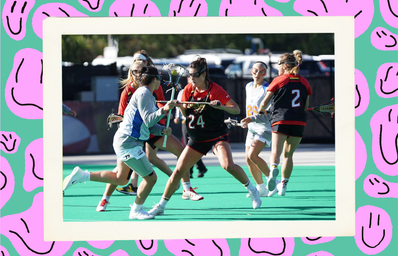Ever since I can remember, I’ve been surrounded by sports. I couldn’t even begin to count the number of summer afternoons that I spent at my brother’s baseball games growing up, where I sat and watched him swing from behind the plate as my dad coached from the sidelines. For hours, I’d sit on uncomfortable metal bleachers in the blistering heat, just begging my mom to let me get a hot dog or buy a bag of candy from the concession stand.
I guess it was hearing the news about college athletes and endorsement deals, specifically the National Collegiate Athletic Association’s (NCAA) recent revision to name, image and likeness that conjured up some of these memories. No, my brother never became the MLB superstar he once dreamed of being and even my own volleyball career never continued on the collegiate level.
Once I began playing sports myself, I realized why my parents had always insisted that I attend my siblings’ games. As an athlete, feeling supported was one of the best parts of the experience. Now, as of July 1, college athletes are now allowed to accept social media endorsements, brand deals, etc. as a stream of revenue. This change provides an opportunity for even some of the busiest of students to support themselves financially.
As of July 1, college athletes are now allowed to accept social media endorsements, brand deals, etc. as a stream of revenue.
As defined on the NCAA’s website, name, image and likeness, are three elements of a broader legal term known as “right of publicity.” Essentially, the NCAA had formerly prohibited college athletes from participating in promotional activities — such as appearing in commercials or posting advertisements on Instagram — where they could earn a profit.
If you’re anything like me, you may be wondering: why now? Why did the NCAA just now adopt policy changes for a debate that’s been going on for years? After all, I remember this being one of the most frequently covered topics in persuasive speeches throughout my middle and high school English classes.
This isn’t a new conversation by any means. While the NCAA finally removed its prior restrictions, the challenge for consistency between states remains, though, as Congress has yet to agree on a federal law for all schools to enforce. According to ESPN, 12 states have already implemented new laws that allow for college athletes to profit off of their individual name, image and likeness (NIL) since the NCAA’s changes took effect on July 1.
So, what is a person like me — who roots for their alma mater and occasionally glances at the TV during the Super Bowl — doing talking about college sports?
It’s easy to think, “Well, this really doesn’t impact me — the average person — at all.” But could it affect more people than may initially be expected?
Maybe there’s a chance you’re feeling the same way. You and I, or any other person who wasn’t blessed with the athletic gene, are only left to sit back and speculate about the NCAA. Just in case I haven’t made myself clear: I’m nowhere near being an influencer, certainly not an athlete, and don’t expect to be paid for posting ads on social media anytime soon. It’s easy to think, “Well, this really doesn’t impact me — the average person — at all.”
On the other hand, though, could it affect more people than may initially be expected?
To get my point across, I’d like you to think about your favorite celebrities, YouTube Vloggers, or other social media icons. The prevalence of social media platforms makes it nearly impossible to ignore what everyone else is doing: what they’re buying, wearing, and even eating.
Personally, I think it’s hard to relate to some of the bigger celebrities because not only can there be age gaps, but the comparison among their lavish Hollywood lifestyle to my old, cramped dorm room is immeasurable. Isn’t this why influencer culture is so big right now?
This decision marks a milestone: its provisions will change the lives of college athletes by the thousands, and the lives of average people by the millions.
Adding college athletes to the laundry list of people who can, quite literally, be referred to — and make part of their living off of — as “viral” or “influencers” will naturally change the behaviors of everyday consumers, too.
For example, if I’m contemplating which pair of sneakers to buy or don’t know which workout program to start, and I happen to see not only someone successful endorsing something, but someone my age raving about a product… game over! Odds are, I’d go with whatever they were trying to sell.
Though I’m no expert in tracking data analytics or forecasting trends, I’d assume that huge corporations and smaller businesses alike will benefit from these policy changes, too. When I think about professional athletes’ affiliations with brands, one that immediately comes to mind is Nike’s partnership with Colin Kaepernick. Almost five years ago now, Kaepernick was subject to public scrutiny after refusing to stand on the sidelines during a San Francisco 49ers game. While his activism was seen as radical to some, Kaepernick became the face of Nike in 2018: a brand that has since been known for its support of the Black Lives Matter movement.
Just last year, public relations firm 5WPR published its 2020 Consumer Culture report, which indicated that 83% of young consumers wish for companies’ values to align with their own. The possibilities for brands to adopt ambassadors and other influencers continues to expand with the inclusion of college athletes.
According to 5WPR, 83% of young consumers wish for companies’ values to align with their own.
Also in 2020, the National Retail Foundation released a survey and found that 72% of over 1,000 Gen Z respondents reported that they were more likely to purchase from brands they followed on social media. Given that this current conglomerate of student athletes and their peers fit into this category, I’d expect for some new trends to emerge, or for old purchasing patterns to change as a result.
Besides, who wouldn’t want to see others from their university represented on the big screen — whether on an actual TV commercial or as the face of an Instagram campaign. Without a doubt, I would’ve supported any project that Saquon Barkley collaborated on as a member of the Penn State football team (if he would’ve had the chance to do so a couple years ago, of course).
If sports aren’t your cup of tea, or you frankly couldn’t care less about your university’s hockey team, you may be unenthused and indifferent to what the NCAA has announced. However, I can assure you that this decision marks a milestone: its provisions will change the lives of college athletes by the thousands, and the lives of average people by the millions.
Source:
Cullen, K. (2020). How Brands Can Use Social Media to Connect With Gen Z. National Retail Foundation.
5WPR. (2020). Consumer Culture Report. 5WPR.


